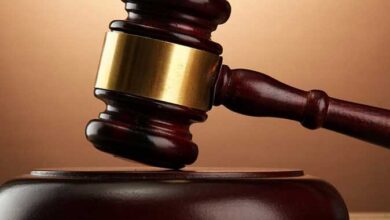On the wall of his room, Ragai Sultan has a black and white photograph of his father, who served in the military, shaking hands with President Gamal Abdel Nasser.
Thirty years later, Sultan, a man with special needs and is diagnosed with low IQ, never anticipated that he would be randomly picked up on the street by the police, insulted, and beaten for doing nothing.
On the evening of 22 July, 2008, Sultan was walking by the corniche in his hometown Alexandria when police arrested him as part of a wave of juvenile arrest. Sultan was angered and told policemen his brother would come to defend him. Then Colonel Akram Suleiman of the Security Directorate beat him, causing permanent damage to his skull and shoulder. More than a year later, a court verdict ruled Suleiman guilty misuse of force and causing permanent handicap. He was sentenced to five years in prison.
“I am very happy,” says Sultan, 47, in his first meeting with Al-Masry Al-Youm English Edition after the trial. So are human rights activists who for long have been fighting against the impunity enjoyed by policemen implicated in torture cases. Sultan’s case sheds light on their strategies in torture cases, where they often linger on legal impediments in order to achieve favorable verdicts.
“Now I can think about my next surgery,” Sultan says, smiling. “I wish now I can go for an umra (religious pilgrimage).” As he was speaking he answered phone calls from activists who wanted to congratulate him on the verdict.
Although the verdict has given Sultan some confidence, it neither means that he will forget what happened nor that he is no longer scared. “How can I forget?” he says while he recounts snippets of what happened after his arrest last year. “Why didn’t he [Suleiman] interrogate me if he thought I did something wrong instead of beating me up? I don’t understand when they say ‘the police are at the service of people,’" he adds, trying to rationalize the brutality.
“Do you think it’s really over? I won’t be hurt anymore?” he anxiously asks his psychiatrist, who tries to ease his fear of a retaliation from Suleiman.
His psychiatrist, alongside a group of lawyers and activists from el-Nadeem Center for the Rehabilitation of the Victims of Torture, were constantly with Sultan in the lead-up to the verdict. Their work has been instrumental in bringing the case to court, according to Mohamed Abdul Aziz, a lawyer.
Abdul Aziz explained several factors that contributed to the court’s decision. “The strength and will of the victim to continue the case was indispensable, despite the pressure he faced,” he says. Elhamy Sultan, Ragai’s brother and guardian, has told the court in one hearing that Suleiman’s associates offered to financially support the family in exchange for dropping the case. “The psychological support to Ragai and his family was also important in encouraging them to pursue the case,” Abdul Aziz says.
He also lauds the pace with which different stakeholders did their jobs. The Public Prosecutor was diligently interrogating witnesses and collecting documentation in order not to give Suleiman time to pressure Sultan or change testimonies. Lawyers actively uncovered maneuvers by Suleiman’s defense and reported them to the prosecutor. The forensic authorities provided medical reports that were compatible with the testimonies of Sultan and his brother.
“I was 60 percent sure that we would make it,” says Abdul Aziz. “I learned a lot from this case. The most important thing is to pay attention and be alert to the offender’s tactics.”
Throughout the case, Suleiman’s defense tried to undermine the forensic authorities’ claims that Sultan was beaten on the head with an object by saying that he fell while trying to escape from policemen during the arrest. The defense also claimed that Sultan was arrested because he was seen with a woman, who testified that Sultan was going to pay for sex. In an earlier attempt to reverse Sultan’s claim, Gamal Suweid, Suleiman’s lead attorney, told Al-Masry Al-Youm English Edition that a lower ranking policeman, not Suleiman, had beaten Sultan. According to Suweid, Suleiman was only accused because he heads the police station.
“It was a very strong verdict that did not make proper use of the law,” said Suweid in a telephone conversation with Al-Masry Al-Youm English Edition. “We have immense belief in the expertise of the appeal court and we will go there in 60 days. I am sure the verdict will change.” His client was seen crying in his dock as the verdict was pronounced.
The appeal court’s decision is what will confirm the value of the court ruling, as a final and categorical penalization for misuse of power and causing permanent disability.
“The verdict has an important moral significance," says Ahmed Seif al-Islam, a lawyer and long-time defense attorney in torture cases. "Its legal significance will unfold when the reasoning is announced.” He said that throughout his professional life, this is one of the three heaviest sentences he has witnessed in a torture case.
According to al-Islam, the relevance of cases where torture is heavily penalized stems from the creation of a discourse that will be directed to judges by human rights lawyers in future cases. “Those cases can become a platform to use new instruments in court, such as human rights terms and international definitions of torture,” he says. “For example, they could be used to reduce judges’ resort to article 17 of the penal code, which gives them the leeway to lower the punishment as per the case’s circumstances.” While precedents do not technically have legal weight in the Egyptian judiciary, they could be used to convince judges.
Documentation of such rulings, their reasoning, and the defense tactics used are essential in human rights activists’ quest to combat torture despite incumbent legal traps, according to al-Islam. The Egyptian penal code limits the definition of torture to use of force to extract confessions. Moreover, during investigations, a classic challenge is to prove who perpetrated the torture. In most cases, trials are suspended because of an inability to identify the offender.
Beyond the judicial implications of the case, Sultan’s life has substantively changed. Standing on his balcony overlooking a garden, he thinks about it. “You know, I stopped going to walk by the corniche," he says. "You never know what can happen again. It’s better to be safe.”



